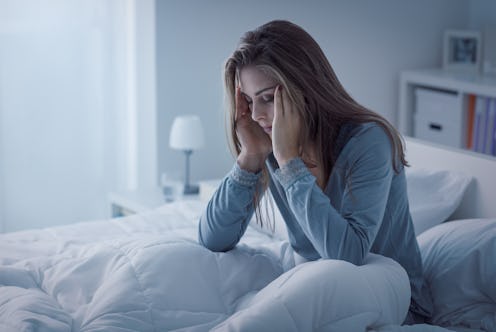
I’m a chronically tired person, and I think I speak for many chronically tired people when I say I’m tired of being told to just sleep more. That’s because no matter how many hours of sleep I get, I wake up exhausted. This isn’t uncommon, and it can have a variety of causes, from bad habits to medical conditions. Whatever the problem, what’s clear is that the solution isn’t always more sleep.
“It’s not just the quantity of sleep. It’s also the quality,” family medicine doctor Susan Besser, MD tells Bustle. Most people need six to eight hours of sleep per night, she adds. But while that’s necessary to perform at optimum energy, it’s not sufficient. You also need to sleep uninterrupted through the night.
“Sleep is not just one stage — it’s a continuum of several stages of sleep from light (REM) sleep to deep sleep,” Besser says. “During the night, we cycle through these stages. The full cycle takes about 90 minutes, so there are several cycles throughout the night. If sleep is disrupted or fragmented, you might miss a stage, and that affects sleep quality.”
Here are some ways experts say your nights might get disrupted and leave you exhausted no matter how much sleep you get.
1Noise In Your Surroundings
Noises often wake us up throughout the night, leading to a deficit of deep sleep, says Besser. If you share a room or there's lots of noise outside, try sleeping with earplugs in.
2Light In Your Room
Light in our surroundings can also wake us up, says Besser. Turn off all your lights, close your laptop, turn off your TV, and face your phone away from you so the light doesn’t reach your eyes.
3Pain
Pain in our bodies can serve as a distraction, says Besser. If you wake up with a particular part of your body hurting, you may have to treat that pain before you can solve the sleep problem.
4Bathroom trips
Waking up often to go to the bathroom prevents you from getting through every stage of sleep, says Besser. If you’re always getting up to pee at night, talk to a doctor about the potential causes, which can range from medical conditions like diabetes or interstitial cystitis to habits like consuming too much caffeine or alcohol.
5Restless Leg Syndrome
Restless Leg Syndrome (RLS) is a condition in which your legs involuntarily move during your sleep, which can wake you up, says Besser. It usually requires a doctor to diagnose and is treated with changes in diet.
6Sleep Apnea
When you have sleep apnea, you momentarily stop breathing in your sleep, which can lead you to awake to resume breathing. If you share a room with anyone, ask them if you snore — this is a telltale sign of sleep apnea.
7Eating Before Bed
If your body’s at work digesting food — particularly processed food, sugar, and other food that’s hard to digest — you might wake up. Experts recommend not eating within two or three hours of bedtime and eating digestible foods for dinner.
8Excessive Drinking
Alcohol not only leads to late-night wakeups but also decreases the time you spend in REM sleep, Kimberly Fenn, Reverie Sleep Advisory Board Member and Associate Professor of Psychology at Michigan State University, tells Bustle.
9Uncomfortable Room Temperature
The same way noise or pain can wake you up, so can the discomfort of an excessively hot or cold room, says Fenn. The ideal temperature for sleeping is between 60 and 67 degrees Fahrenheit.
10Waking Up In A Deep Sleep
If your alarm sounds while you’re in one of the deep sleep stages, you’ll feel startled and have trouble getting up, Parinaz Samimi, MPH, MBA, a health and wellness consultant with Sleep Train, tells Bustle. It’s hard to predict when you’ll be in this stage, so it’s best to wake up naturally. If you need an alarm, try one that wakes you up gradually with light or slowly building noise.
11Inconsistent Sleep
Even if you got eight hours of sleep last night, you may not feel well-rested if you didn’t get as much sleep the night before. “The less we regularly get, the less helpful it really is when we do get good sleep for one night. Sleep debt needs time and consistency to recover from,” says Samimi.
Low-quality sleep can have debilitating effects on your life, so even if you think you’re sleeping well, it can’t hurt to make some changes to eliminate some of these problems.